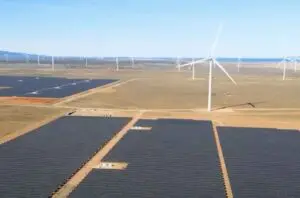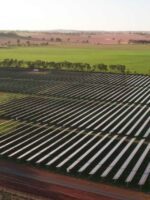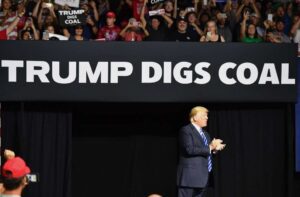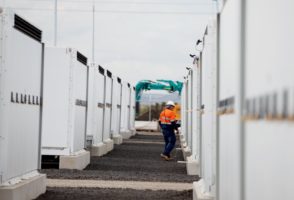Australia’s Electrical Trades Union has slammed the “brutal sacking” – by text message – of 230 workers on a Queensland solar farm, as laying bare the ugly and Wild West-like conditions plaguing the national solar industry.
As RenewEconomy reported on Monday, work was brought to a halt at the 120MW Gangarri solar project near Wandoan in Queensland – the first major solar farm to be built in Australia by global oil giant Shell – after an alleged dispute over payments between contractors led to the standing down of up to 230 workers on Monday.
The 230 casual workers, many of whom were working 60-plus-hour weeks installing solar panels and doing electrical work on the site, were informed of the news without notice, and via text message first thing on Monday morning.
It is believed that problems at the site had been brewing for some time and at least some of the issues emerged from a dispute between the EPC (primary) contractor, the Indian-based Sterling and Wilson, and the electrical contractor, Davis Contracting.
The ETU on Monday described the situation as “disappointing,” but come Thursday the union had some stronger words for the companies involved, the broader renewables industry, and the state of industrial relations under the federal Coalition government.
“We have an appalling situation where hard-working Queenslanders, electricians and mechanical fitters have been sacked due to a ‘contractual disagreement’ between two companies … the workers were given no notice other than a text message at 6am and they and their families face an uncertain future. It’s brutal and it’s disgusting,” said ETU state secretary Peter Ong in a statement.
“Big businesses like Sterling & Wilson have exploited the loopholes in the Fair Work legislation, where they can let workers go at a whim, they don’t care how the workers are treated, it’s all about getting the biggest bang for their buck,” Ong said.
“And that is exactly what the LNP wanted, they designed the legislation to ensure maximum flexibility at the expense of job security and this has resulted in these kinds of business models of exploitation.”
And while Ong had some positive words for the IR blueprint presented by Opposition leader Anthony Albanese on Wednesday night – which would see protections and rights for casual employees enshrined in legislation – he had little positive to say about the solar industry.
“The solar industry is a bit of a cowboy industry at the moment where … there is a lot of uncertainty in the industry. These failures in policy are leading to an influx of overseas-owned speculators who are failing to do the right thing by the owners of the solar farms and their workers.
“The renewables industry should be providing secure jobs to Australian workers employed by local contractors who pay their bills, we will continue to fight for better protections for casual workers and labour hire as well as certainty and accountability in this important sector,” he said.
As RenewEconomy has reported, Sterling & Wilson is a new entrant to the Australian solar market, which has witnessed the departure, and failure, of numerous contractors because of big losses caused by connection delays and other problems. One big Australian contractor, RCR Tomlinson, collapsed and was liquidated because of big losses from solar contracts.
Sterling & Wilson has landed other major contracts in Australia. Apart from Gangarri, it has built the 200MW Wellington project owned by another oil major BP and its solar joint venture BP Lighthouse, and what will be the country’s biggest solar farm, the 420MW Western Downs project being developed by Neoen.
Shell’s Gangarri project began construction a year ago and was expected to be complete in early 2021, but the ETU’s Queensland rep, Dan McGaw, said the mechanical installation was less than half complete, and only 13 per cent of the electrical work had been completed.








